Key takeaways:
- Sustainability in fisheries requires balancing fish populations and community needs, highlighting the interconnectedness of environmental and social issues.
- Effective strategies like catch shares and marine protected areas foster ownership, accountability, and ecological health, benefiting both ecosystems and local economies.
- Collaboration between fishermen and scientists enhances sustainable practices and knowledge sharing, emphasizing the importance of community engagement in fishery management.
- Technological innovations and grassroots initiatives play crucial roles in future ocean conservation efforts, alongside the necessity for policy alignment with local insights.
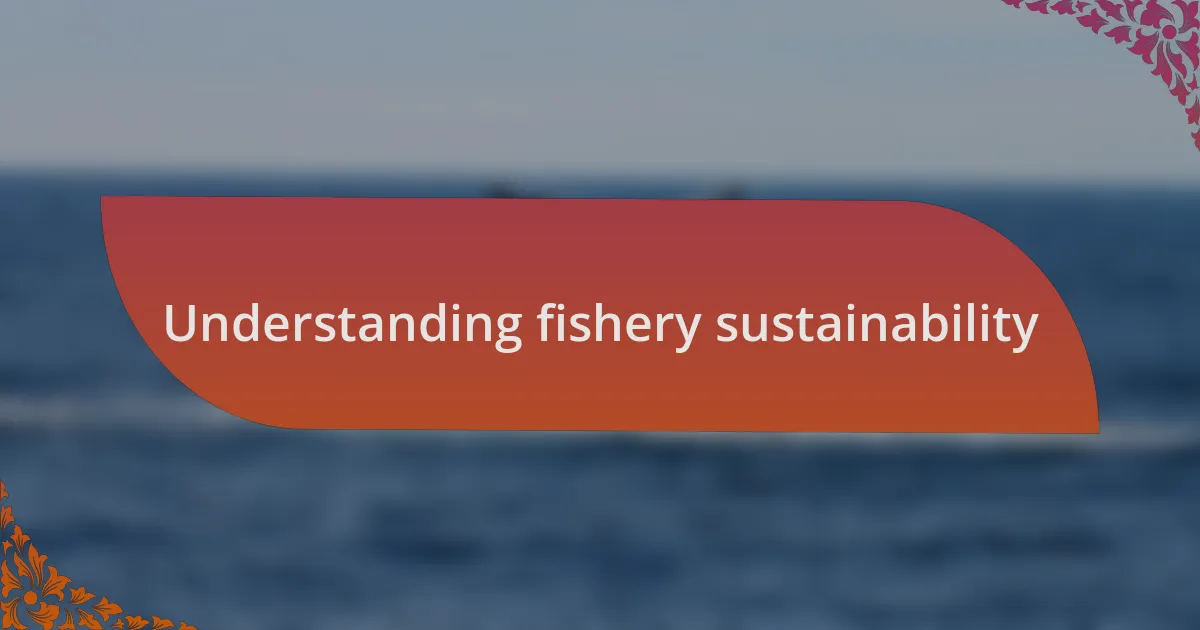
Understanding fishery sustainability
Sustainability in fisheries means ensuring that fish populations can thrive while also supporting the communities that rely on them. I’ve had the chance to visit local fishing communities, and seeing firsthand how they balance their needs with the health of marine ecosystems was eye-opening. It made me wonder—how can we all contribute to this delicate balance?
When I explored the topic more deeply, I found that overfishing doesn’t just deplete fish stocks; it disrupts entire ecosystems, affecting everything from predator-prey relationships to the livelihoods of fishermen. This realization hit home one summer while volunteering at a marine conservation center. I spoke with fishermen who had watched their catches dwindle over the years, feeling a mix of frustration and helplessness. It’s a stark reminder that sustainability isn’t just an environmental issue; it’s a social one too.
Engaging with fishery sustainability requires understanding complex concepts like adaptive management and ecosystem-based approaches. These terms might sound technical, but they reflect a commitment to using science and community knowledge to make informed decisions about fishing practices. I often find myself asking, how can we innovate our methods to preserve our oceans while still enjoying the bounty they provide? The answer lies in collaboration and education, bridging the gap between scientists, policymakers, and fishermen.
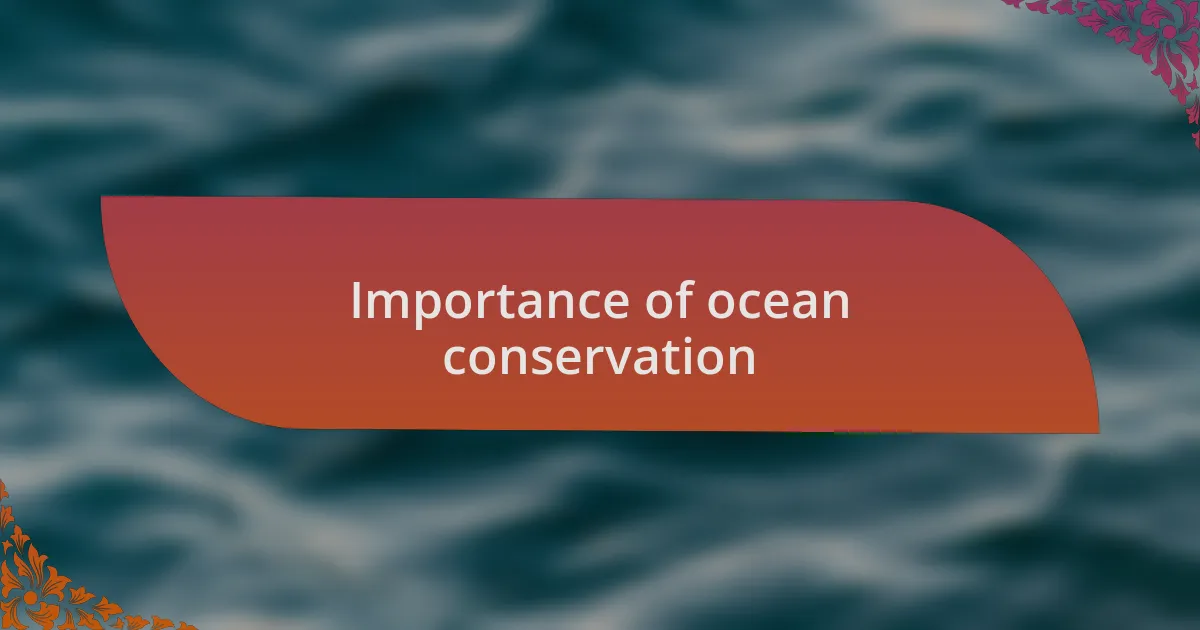
Importance of ocean conservation
The health of our oceans is directly tied to the well-being of our planet and its inhabitants. During a beach cleanup I participated in, I witnessed how pollution not only harms marine life but also affects the communities that depend on these waters for their survival. It struck me then how interconnected everything truly is—each piece of plastic discarded can lead to a ripple effect, impacting everything from fish populations to local economies.
I often think about how ocean conservation is more than just protecting marine species; it’s about preserving the fabric of life itself. One afternoon spent snorkeling in a vibrant coral reef left me in awe of the diversity that thrives underwater. However, I also couldn’t ignore the stark contrast of bleached corals nearby. How could we allow such beauty to slip through our fingers? The urgency to conserve our oceans weighs heavily on my mind, fueling my desire to advocate for sustainable practices.
In conversations with fellow conservationists, I’ve found that many share a common hope: to inspire action and foster a deep connection to the ocean. It’s not just about statistics or ecological models; it’s about the stories we carry and the legacy we leave behind. What mark do we want to make? Each effort in conservation not only safeguards marine ecosystems but also enriches human lives, reminding us that the ocean is a vital part of our shared heritage.
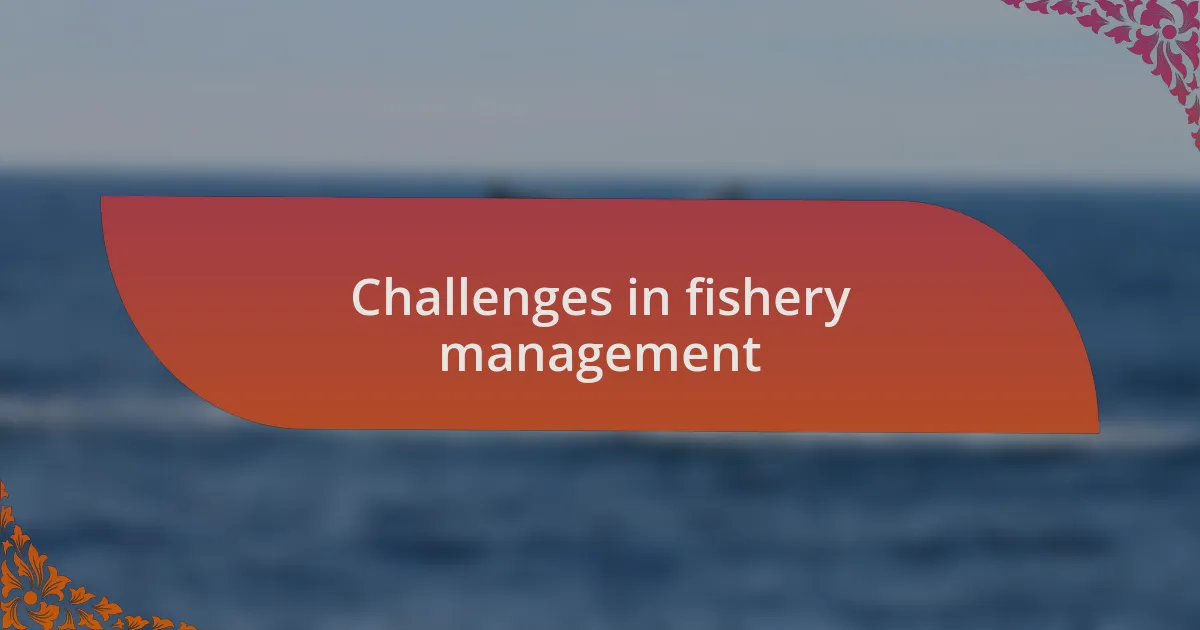
Challenges in fishery management
The intricacies of fishery management present significant challenges that often go unnoticed. During a recent workshop on sustainable fishing practices, I learned that balancing fish populations with human demand is akin to walking a tightrope. Overfishing not only threatens species but also disrupts entire ecosystems. What options do we have when nature and human needs seem at odds?
Another pressing issue is the lack of effective regulations across different regions. I’ve spoken to fishermen who operate in jurisdictions with varying rules, leading to confusion and inconsistency in practices. This disparity can foster illegal fishing, which undermines efforts for sustainability. How can we expect cooperation when the rules of the game keep changing?
Additionally, climate change complicates the picture, shifting fish habitats and altering breeding patterns. Imagine a fisherman’s frustration when his usual catch suddenly disappears due to rising ocean temperatures. The emotional toll of uncertainty weighs heavily on those who depend on the sea for their livelihood. Have we considered the long-term implications of failing to adapt to these changes? Sustainable fishery management is not just a regulatory challenge; it’s a matter of survival for communities worldwide.
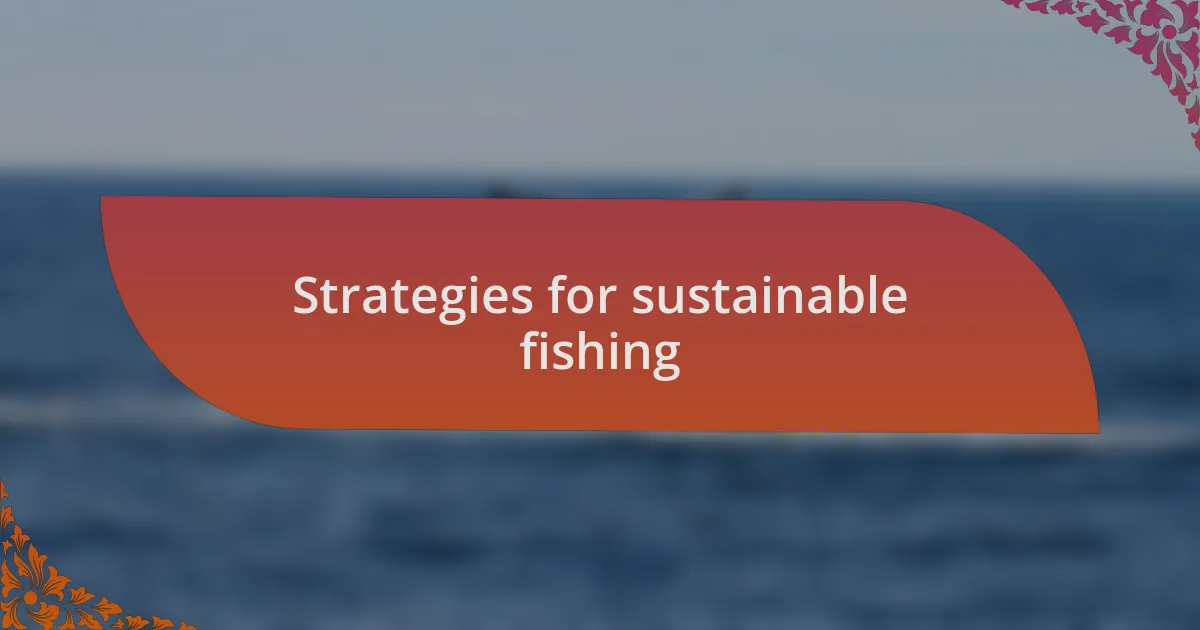
Strategies for sustainable fishing
One effective strategy for sustainable fishing is the implementation of catch shares, which allocate a specific portion of total allowable catch to individual fishermen or communities. When I first encountered this concept, I was intrigued by how it creates a sense of ownership and accountability among fishers. It’s fascinating to see that when fishermen have a stake in the resources, they’re more likely to fish sustainably, knowing their livelihoods depend on the health of the stocks. Isn’t it empowering to think that a little ownership can lead to collective responsibility?
Another approach that caught my attention is the promotion of marine protected areas (MPAs). During a visit to a coastal community that has embraced this strategy, I observed how it allowed local ecosystems to thrive while simultaneously benefiting the local economy through eco-tourism. I couldn’t help but marvel at the balance they struck—nature regenerating while providing new opportunities for the community. Isn’t it incredible how preservation can lead to revitalization?
Lastly, engaging in community-based management is essential for long-term sustainability. In my experience, when local stakeholders are involved in decision-making processes, the outcomes are generally more favorable. I recalled an instance where fishermen collaborated with scientists to monitor fish populations, creating a more comprehensive understanding of their ecosystem. It made me wonder, how can we forge deeper connections between fisheries and science for the betterment of both? These collaborative efforts highlight that sustainability isn’t just about regulations; it’s about building relationships.
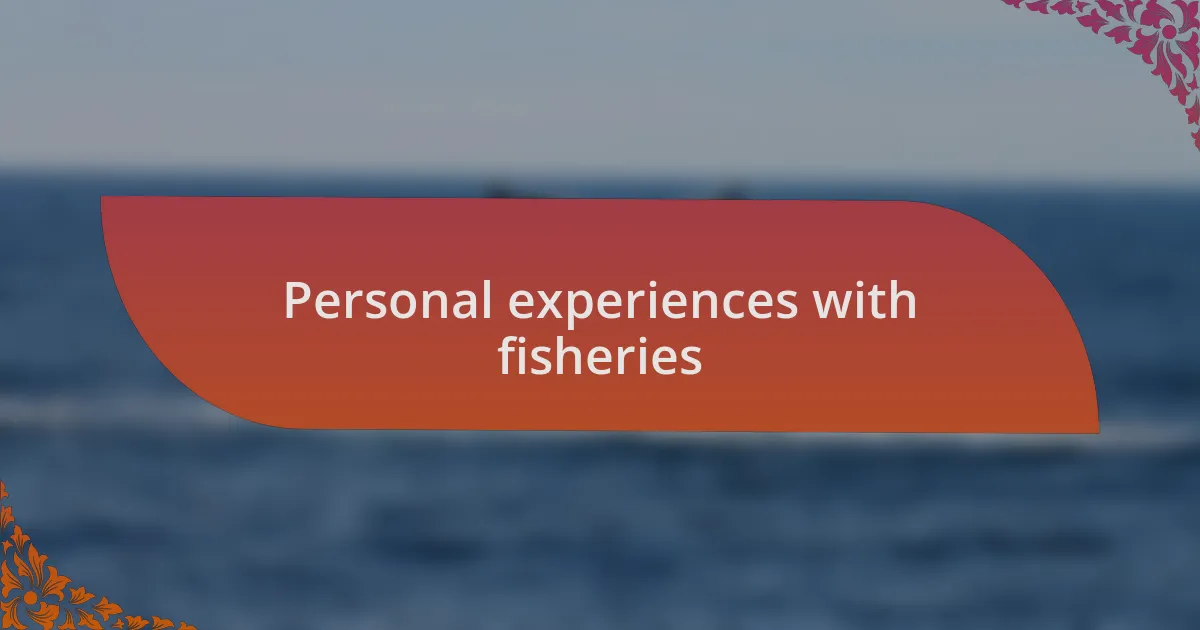
Personal experiences with fisheries
Growing up near the coast, I frequently visited local fisheries with my family. I vividly remember observing the fishermen’s pride as they showcased their catches, but what struck me the most was their concern for the future of their trade. Hearing their stories about dwindling stocks made me realize that the passion for fishing often coexists with a deep awareness of sustainability. It left me wondering, how can we support these communities to ensure they can continue their heritage?
One particular memory stands out from a community workshop I attended, where fishers shared their struggles with overfishing. I noticed a palpable sense of frustration and helplessness in the room. It was during that session that I learned about the importance of sharing knowledge about sustainable practices. The camaraderie that grew from this experience made me reflect on how critical it is for fisheries to innovate while valuing traditional methods. Are we doing enough to empower these communities with the tools they need to thrive sustainably?
On a recent trip to the market, I decided to chat with a seller who was passionate about sourcing fish from sustainable fisheries. As we discussed the impact of consumer choices on the health of fish populations, I felt inspired by his commitment to promoting responsible fishing. His enthusiasm reminded me that each purchase we make can play a role in shaping fisheries’ future. It brought to light the connection between our choices and the well-being of our oceans. How often do we pause to consider the origin of our food?
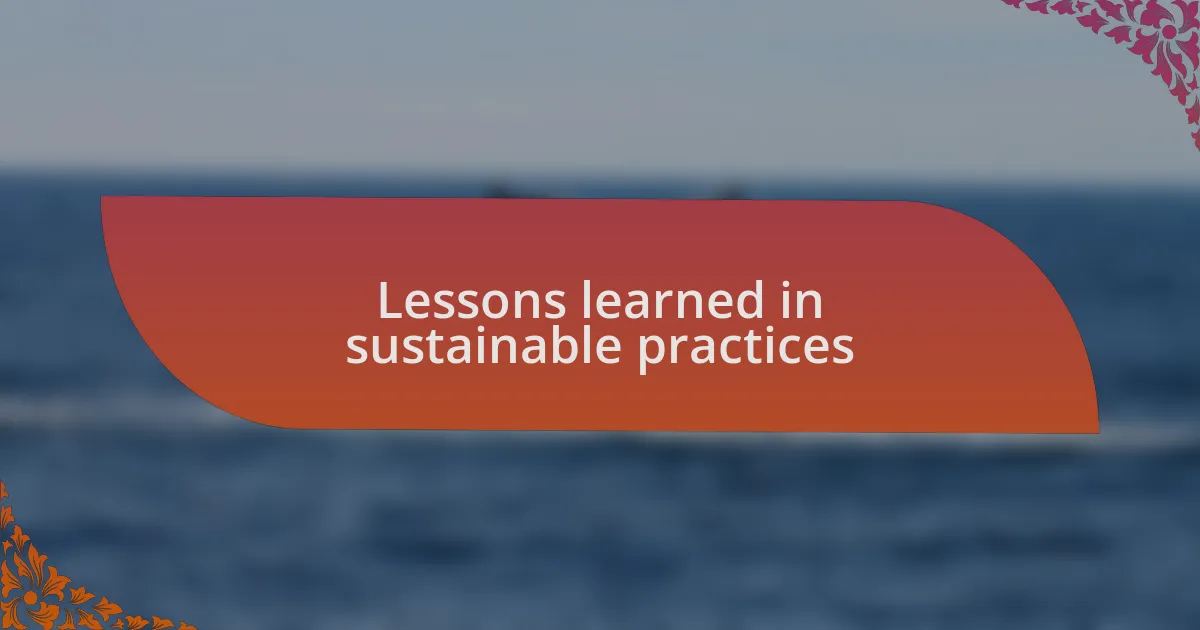
Lessons learned in sustainable practices
One key lesson I learned about sustainable practices is the power of local partnerships. I remember visiting a coastal community where fishermen teamed up with scientists to monitor fish populations. This collaboration not only provided valuable data but also fostered a shared commitment to protecting marine resources. It made me realize that sustainability is a collective effort; when communities unite with experts, they can create powerful change.
Another important insight came from a visit to a marine protected area. Walking along the shore, I saw how these zones allowed ecosystems to thrive, benefiting both marine life and local fisheries. This experience highlighted that sometimes, stepping back from certain fishing areas is necessary for long-term gains. It poses a provocative question: Are we willing to sacrifice short-term profits for sustainable futures?
Reflecting on a community event I attended, I was struck by the fishermen’s stories of transformation through education. They shared how learning about responsible fishing methods and consumer demand shifted their practices. It sparked a thought in me—how can we all contribute to this cycle of learning? Supporting educational initiatives might be the key to ensuring future generations of fishers and seafood lovers appreciate the balance between harvest and conservation.
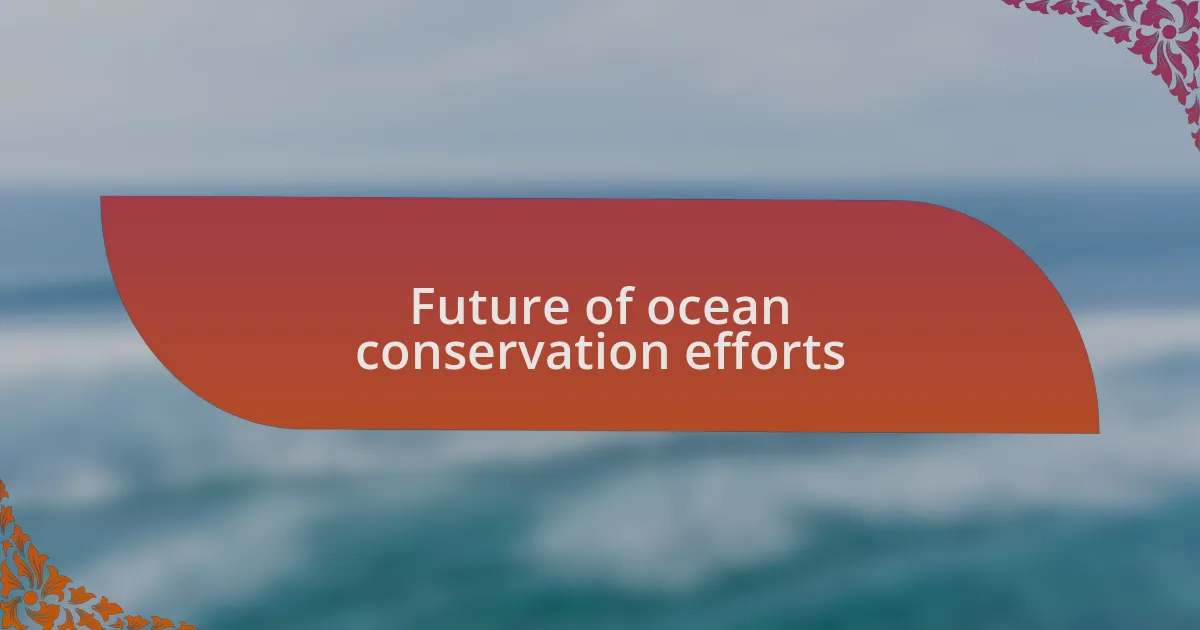
Future of ocean conservation efforts
As I ponder the future of ocean conservation efforts, I can’t help but think about the role of technology. During a recent forum, I encountered innovations like underwater drones and AI that monitor fish movements and habitats in real time. It made me wonder: could these advancements be the key to safeguarding our oceans against overfishing and habitat destruction? The thought that technology could play such a crucial part is both exciting and daunting.
I also reflect on community-driven initiatives that are gaining traction. I remember a small beach clean-up I participated in where locals rallied together to protect their coastline. The enthusiasm was palpable, and it was clear that grassroots efforts like these hold immense potential for larger conservation movements. This makes me ask, what happens when ordinary people take their passion for the ocean and turn it into action? The answer, I believe, is an empowered society ready to tackle pressing environmental issues.
Finally, the role of policy cannot be overlooked. After attending a recent seminar on marine legislation, I realized how crucial it is for policymakers to listen to local voices. Their experiences can provide invaluable insights that shape more effective conservation laws. It leaves me pondering: how can we bridge the gap between scientific research and legislative action to ensure our oceans thrive for generations to come? Addressing this question may just be the cornerstone of future conservation success.